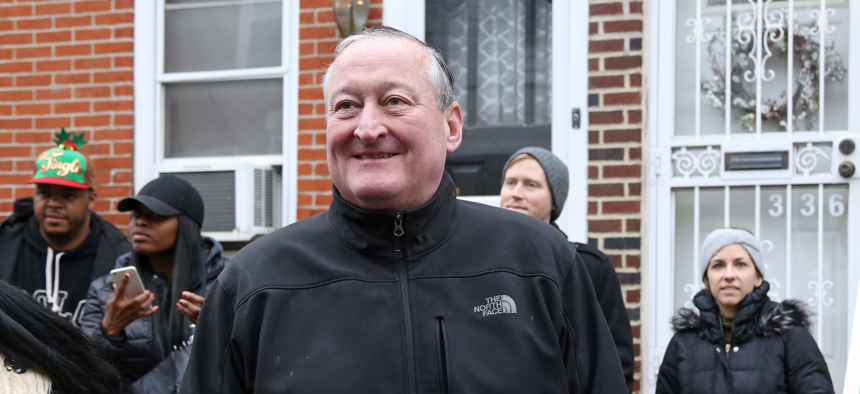Philadelphia’s Mayor Touts a Holistic Strategy to Ending Gun Violence

Philadelphia Mayor Jim Kenney assists with Operation Holiday Help in December. Samantha Madera / City of Philadelphia
But Jim Kenney also warns his fellow mayors that “without the help of federal and state governments in education and job training and addiction services, we’re never going to turn the corner.”
WASHINGTON — Before Philadelphia Mayor Jim Kenney leaned in to the microphone, the remarks from the dais during a session at the U.S. Conference of Mayors annual winter meeting on Thursday were pretty much what you might expect from a panel on gun violence.
The mayors that went before him spoke of police training—on issues like community engagement and officer wellness—as well as police technology. Shotspotter, the gunshot detention tool was mentioned a few times. A few of the mayors talked about the importance of building partnerships and relationships with federal agencies like the Justice Department and the Bureau of Alcohol, Tobacco, Firearms and Explosives.
But Kenney didn’t appear to be satisfied with that level of discourse. His philosophy on the eradication of gun violence is much more comprehensive, and will require something different from the federal, state and local partnership than he thinks he’s currently getting.
“Actually in Philadelphia we have a wonderful relationship with our Department of Justice, our FBI and ATF. That’s really not the problem,” Kenney told the crowd.
“If I had to highlight three agencies I wish we had more help from in the federal government,” he added, “it would be Department of Labor, Department of [Health and] Human Services and the Department of Education.”
Overall, crime is down in the City of Brotherly Love. Philadelphia’s police officers are making fewer pedestrian stops—intentionally so, as part of an attempt to improve police relationships with the community—and they’re getting more and more guns off the streets. Likewise, the city has reduced its incarcerated population since Kenney came to office, down from 8,000 people to 6,300 people. But the actual policing is just another piece of the puzzle as far as Kenney is concerned.
“The basic issue is if you’re not educated, and you’re not trained to take a job that makes sense for your family and to provide a standard of living for your family, you’re going to be on the street doing stuff you shouldn’t be doing.”
With that philosophy in mind, Philadelphia, under Kenney’s direction, has been undertaking a decidedly holistic strategy to keep its streets crime-free.
“What we’ve been concentrating on in Philadelphia is quality pre-K, community schools, rebuilding our infrastructure—our parks, recreation centers and libraries—making communities whole again, and trying to get our police to understand that throwing a young black man on a car and stopping and frisking him for no particular reason only makes the community less engaged with the police.”
But, Kenney added, his city can’t afford to be doing all this work all on its own.
“[W]ithout the help of federal and state governments in education and job training and addiction services, we’re never going to turn the corner,” he said.
And, Kenney isn’t shy about another way he could use more understanding from his federal partners—immigration reform.
“The other issue, frankly, from the federal government’s standpoint is the issue of immigration and deportation and the fear that many of our immigrant communities have who are living in somewhat crime-plagued areas,” said Kenney.
Immigration became the hot-button issue for the mayors’ winter meeting on Wednesday when the Justice Department sent a letter to 23 local and state governments threatening legal action if those jurisdictions refused to disclose documents related to immigration enforcement. That announcement came just hours before the mayors’ event got underway. In protest, several mayors said they would boycott a planned afternoon meeting at the White House with President Trump. Kenney was among the mayors to refuse that sit-down and he did so in not-so-subtle terms.
Kenney elaborated on his views on immigration during the gun violence panel in a way that made it clear that he sees the issue going hand-in-hand with public safety. In his remarks, Kenney described immigrant communities who “are unwilling to step up and talk to the police, or are unwilling to step up and meet with the police or are unwilling to step up and report crime because they’re afraid of their own government.”
“If that chill that has been put on our communities continues, we’re never going to solve the crime problem … It’s just very frustrating, very demoralizing and it’s a real concern about how we actually interact with our communities when people are so fearful,” Kenney added.
But, at the end of the day, Kenney continues to believe that it will be through education and and job opportunities that he will be able to deliver greater public safety to the residents of Philadelphia.
“If our populations are educated, job-trained, non-addicted and able to get a job, the gun problem, the gun-violence problem and the crime problem will go away on their own,” he said. “Because a person who’s making a living and raising their family and buying a home doesn’t need a pistol in their belt to make a life.”
Quinn Libson is a Staff Correspondent at Government Executive’s Route Fifty, based in Washington, D.C.
NEXT STORY: 2 Maps That Better Explain the Landslide Risk From This Giant Crack Above an Interstate






